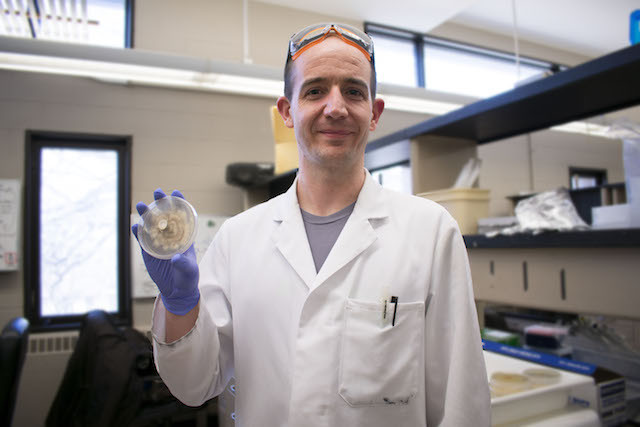He studied at the University of Strasbourg before working at the Laboratoire de Biologie Moleculaire et Cellulaire du Cancer, at the Hôpital Kirchberg, for his PhD thesis, and then the Fundacíon Medina in Spain, and then moved to the US.
Delano spoke with him as part of the “Celebrating Luxembourg” series running this year in Delano and its sister publications.
Aaron Grunwald: Can you sum up in a few sentences what you do for a living?
François Gaascht: Briefly, I collect mushrooms during field trips in parks and forests, I identify them by genetic markers and I include them in our living biobank. Then, I screen the biobank to discover new promising molecules that will be used for the development of new drugs.
If someone said that you were a shining ambassador for Luxembourg, how would you take that?
I would be very glad, but I would also admit that when you are abroad, you realise that you know very little about your country. Here in the US due to the distance, it is quite difficult to promote Luxembourg by describing its typical and amazing landscapes or the atmosphere in the Grund. However, it is still possible to bring “Luxembourg to the US” through dishes such as quetschentaart during summer or boxemännercher that I will try to bake for my colleagues for the Christmas period.
Who do you think makes the best ambassador for Luxembourg abroad?
For me, the best ambassador for Luxembourg abroad can be anyone, whatever his status or his age. This is a person that can convey the values of our country, while respecting the values of the host nation and this--whether it is a small or a heroic act--is a full time job. So, every Luxembourger should be an ambassador when they are abroad.
What does Luxembourg need to do to remain competitive and a player in today’s world? What are its strengths and weaknesses?
As researcher, I would say that Luxembourg should continue to innovate, keep experimenting and do not hesitate to question itself when it is necessary. Luxembourg shouldn’t be afraid about its size but be proud of it, such as its cultural diversity and the open-mindedness of its inhabitants.
When you talk about Luxembourg to non-Luxembourgers, what do they say?
Here in Minnesota, I am not surprised that people don’t know Luxembourg. Some of them know very well this city in France or Germany… but I’ve also had good surprises. Many of them know it as financial place, but some of them mentioned too Vianden castle or the Casemates. In Wisconsin, next to Minnesota, several small cities (e.g., Luxemburg) were established by Luxembourgish immigrants. I didn’t have the opportunity to go there, but I plan to visit them one day when my parents will visit me.
Why did you leave Luxembourg?
I decided to move abroad for professional reasons and especially to acquire and develop new skills. It is something very common for researchers in order to gain experience, work on new projects, collaborate with new people and expand our CV. It is also a phenomenon that we observe in Luxembourg, where many people come from abroad to develop their skills but also share their expertise.
How has scientific research in Luxembourg changed over the past decade or so?
During the past decade, Luxembourg has strongly invested in scientific research and I am very confident about the future when I see the vision and the perspectives about research. I also appreciate the fact that Luxembourg wants to diversify and explore literally new fields such as spatial mining, especially when we know that iron mining and steel industry were important for the development and recognition of Luxembourg.
What do you miss about Luxembourg?
I miss a lot Luxembourg City and strolling the pedestrian streets such as the old part of the city and the mix between tradition and modernity that makes Luxembourg so unique.
What is your impression of Luxembourg now that you live abroad?
From here, I see Luxembourg as a very small country but it is a strong nation made of a mix of different cultures brought by people from different origins that gives to its inhabitants an open-mindedness, a tolerance and a multilingualism unique in the world.
When was the last time you were proud of Luxembourg or of being a Luxembourger?
It was during the last hurricane season in the US, when the authorities used maps generated by the Luxembourg Institute of Science and Technology. Otherwise, from a personal point of view, I am proud to be a Luxembourger every day.
What does Luxembourg mean to you?
Being proud of my origins, never be intimidated by bigger someone or something than me and keep and show how strong I am.
What’s your favourite Luxembourgish word?
It’s a word and an event, d’Schueberfouer, of course.
